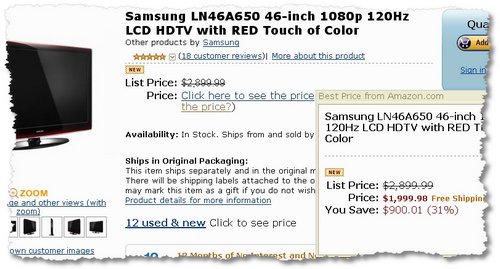Have you ever looked at advertisements carefully? Next time you do… look carefully at the wording, and how they twist common words and phrases that play with your ideas. Amazon is by no means unique in this respect. Let’s take a classic example:

You’ll notice in the ad how we are encouraged to ‘save money’. That’s a great idea! But how? By buying their product! We’ll save over $900.00 (that’s 31%) of the total. That’s impressive.
Now let’s look at the meaning of the words “Save” or “Save $900”! But for the savvy shopper, these are warning signs about how companies play with common meanings of words to highlight their own products, appeal to our emotions and encourage us to open our wallets…
There are a number of meanings that we need to note:
Meaning #1: to put aside as a store or reserve
Naturally, this indicates that we are putting money away somewhere, somehow in a store. In the modern world, stores would include a bank, a broker (perhaps), ETFs… any of a hundred ways. The actual meaning of the word ‘reserve’ means to keep something for a particular purpose or for future need.
Money is defined by Merriam Webster’s as “…a medium of exchange, a measure of value, or a means of payment”. So the term saving money means “putting away something of value for another reason or for future use”.
There are lots of typical examples of ‘saving money’: a single man saves money for his new car, a couple save money for a deposit on a house, an older woman saves money for retirement, … whatever. The idea is that when you save money you are delaying gratification of your purchase of items that would be bring you present comfort, joy and possession. Such gratification may be increased later by purchasing a new car or retiring in comfort to Tuscany.
Meaning #2: to save money on a deal or special offer
Like the advertisement said, you could buy and save at the same time. How? You buy a brand new LCD TV for your living room AND you would save an extra $900 on the purchase price. Let’s forget about price competition, product rotation, and such like…
The term “save money” here simply means to spend less money than previously or than elsewhere. We’re all accustomed to this idea of saving money!
If you buy this LCD TV, are you really saving money?
No, of course not. You are simply spending less than you would otherwise have had to spend.
- For some people, this may be an added bonus (unlikely) since they may well simply spend the extra $900 on a bigger screen size, a more expensive buy-and-save offer, or lots of extra cables and doo-dahs.
- For others, this means that they would buy this model rather than a smaller one because the extra $900 brings the TV inside their budget.
- Still others would simply finance the whole deal, forget about the $900 and worry about how to make the monthly minimum payments on a loan purchase agreement, consolidated loan or credit card. They would likely end up spending more than $250-500 over two years in additional interest payments (based on 13% and 21% financing).
What each of them would likely fail to take into account is that in saving money on the purchase price, they are still spending a whole bunch of money that could be otherwise saved and put in a future store. Of course, the advertisement wants you to spend your money on that item. That’s good for the company selling the item and the company that makes the item. It may not necessarily be good for you.
By playing with the language, these companies will try to confuse you by encouraging you to spend while saving despite the fact that it is impossible. You may delight yourself in this fantasy for a while, but when you open your credit card statement, you WILL know the truth: that LCD TV still cost nearly $2,000; and that money must come from SOMEWHERE.
But is it legal?
This is not the only instance where companies will play with language to confuse, befuddle or intimidate the customer. Some of the tricks that they use are legal, some may be gray, and some will be illegal. Whatever the nature of the legality, it is always in your interest to put your interests first, because the advertisers CERTAINLY won’t. Whatever they claim in their commercials or advertisements.

Such tricks may include: time-limited offers, only x in stock, best value in town or the difference back, seasonal sales, … the list goes on and on. Whatever: we live in a world of abundance, and esp. in tech items, the next generation will ALWAYS be more powerful, less expensive, smaller, lighter and more desirable. In less technologically related areas, you will always be able to buy more towels at great prices, or shoes at 50%… why? Because next season there’s another sale. There’s always going to be another sale.
With sales revenue down in most stores, more people trading down, and customers leaning towards more economical purchasing, stores are going to become more aggressive in their sales tactics, pricing strategies and marketing campaigns. Since wallets are tighter with increasing mortgage payments, skyrocketing fuel and food costs, and increasing weakness in the economy, shoppers may increasingly find themselves vulnerable to smarter strategies in the markets, supermarkets, malls and department stores of America.
Have you seen advertisements that tempt customers to spend by creating confusing slogans? I always remember the “buy now! pay later” ads that were common when I was growing up in the UK. Who cares when you have to pay, YOU STILL have to pay?…
My own sales pitch – Two for the price of one!
So, share some of the more egregious examples here! Come on, you know you want to… oh, and for each comment on this blog, I’ll comment in this thread and follow you to your blog and comment there, too! And that’s a promise! What are you waiting for? Comment today, comment tomorrow, but COMMENT!